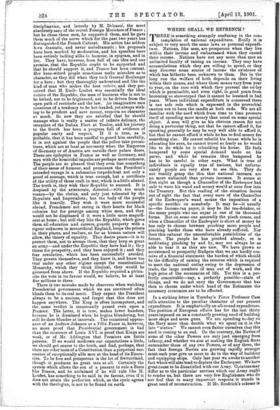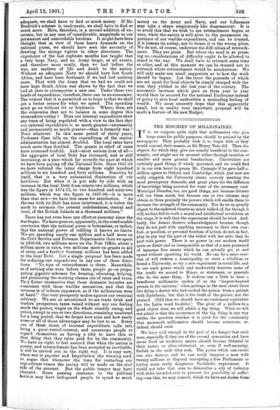WHERE SHALL WE RETRENCH?
THERE is something strangely confusing in the con- templation of national expenditure. Really it is subject to very much the same laws as personal expendi- ture. Nations, like men, are prosperous when they live within their income and embarrassed -when they exceed their income. Nations have not any more than men an unlimited faculty of raising an income. They may have accumulations which they are willing to spend, or they may discover some source of income the existence of which has hitherto beeu unknown to them. But in the long run the welfare of both depends on their living within their means, and where those means vary from year to year, on the care with which they prevent the outlay which is permissible, and even right, in good years from becoming so stereotyped that it cannot be lessened in bad' years. Where individual expenditure is concerned there is one safe rule which is expressed in the proverbial caution not to burn the candle at both ends. We are all familiar with the need which from time to time presents itself of spending more money than usual on some special object. A man will give as his obvious reason for not doing a particular thing, not that he cannot afford it, for speaking generally he may be very well able to afford it, but that he cannot afford it while he has to find money for something else. He cannot rebuild his house while he is educating his sons, he cannot travel so freely as he would like to do while he is rebuilding his house. He feels hampered by some special demand made on his purse, and while he remains thus hampered he has to be careful in other . ways. What is true of individuals is equally true of nations, but unfortu- nately people are very slow to see this. They do not readily grasp the idea that national incomes are no more unlimited than private incomes. It seems at first sight as though a Chancellor of the Exchequer had only to wave his wand and money would at once flow into the Treasury. But this reading of the situation leaves out of sight the fact that every wave of the Chancellor of the Exchequer's wand means the imposition of a specific sacrifice on somebody. It may be—it usually is—the Income-tax payer, it may be the tea-drinker, or the many people who use sugar in one of its thousand forms. But on some one assuredly the pinch comes, and when a Chancellor of the Exchequer is short of money he has only to choose between pinching more people and pinching harder those who have already suffered. Nor does this exhaust the uncomfortable possibilities of the future. The people he has pinched already, or. is meditating pinching by and by, may not always be as able to bear it as they are now. We have grown so accustomed to prosperity Budgets that we can hardly con- ceive of a financial statement the burden of which should be the difficulty of raising the revenue which is required to meet the national outlay owing to the depression of trade, the large numbers of men out of work, and the high price of the necessaries of life. Yet this is a per- fectly conceivable—nay, a perfectly possible—state of things, and we do not envy the Government that has then to choose under which head of the Estimates the necessary economies are to be effected.
In a striking letter in Tuesday's Times Professor Case calls attention to the peculiar character of our present expenditure. It is emphatically an all-round expenditure. The position of European affairs has for the last thirty years imposed on us a constantly growing need of building more ships and more guns. We are spending to-day on the Navy more than double what we spent on it in the late "sixties." We cannot even flatter ourselves that this need is coming to an end. On the contrary, the Navies of some of the other Powers are only just emerging from infancy, and whether we aim at making the English fleets outnumber those of any two Powers, or of any three, the fact that foreign Navies are growing rapidly stronger must each year give us more to do in the way of building and equipping ships. Only last year we awoke to another fact which will also tend to deplete the Exchequer. We have great cause to be dissatisfied with our Army. Opinions may differ as to the particular services which our Army ought to render us, but there. are very few Englishmen whodo not feel that in many important respects it stands in great need of reconstruction. If Mr. Brodrick's scheme is adequate, we shall have to find so much money. If Mr. Brodrick's scheme is inadequate, we shall have to find so much more. Here, therefore, is a second addition of un- certain, but in any case of' considerable, magnitude to our permanent and unavoidable burdens. *It might have been thought that in view of these heavy demands on .the national purse, we should have seen the necessity of drawing. the strings tighter in other. directions: The experience of the last eighteen months 'has taught that a very large Navy, and an Army larger, at all events, and therefore more costly, than we had before the war, are matters of life and death to the nation. Without an adequate Navy we should have lost South Africa, and have been fortunate if we had lost nothing Mote. That with the Army that we had we could not have kept' South Africa was shown by the fact that we had at once to extemporise a new one. Under these two heads of expenditure, therefore, there can be no economies. The' utmost that it is permitted us to hope is that we shall get a better return for what we spend. The spending. must go on without • let or 'hindrance. Where, then, are the economies that are to balance in some degree this tremendous outlay ? Does our internal expenditure show any trace of being regulated with a view to the fact that our external expenditure is so much greater—necessarily and permanently so much greater—than it formerly was ? None whatever. In this same period of thirty years, Professor Case tells us, the expenditurp of the central administration has almost, doubled, The local rates have min+ more than doubled. The grants in relief of rates have increased tenfold. And—most serions item of all— the aggregate of local Debt has increased, and is still increasing, at a pace which far exceeds the pace at which' we have been paying off the National Debt. Since 1867-68 we have -reduced the latter charge from eight hundred millions to six hundred and forty millions. Standing by itself, that is a very. substantial diminution of our liabilities. But when it is put side by side with an increase in the local Debt from ninety-two millions, which' was. the figure in 1874-75, to two hundred and sixty-two millions, which was the figure in 1897-98—it is more than that now—we have less cause for satisfaction. "As the war with its Debt has since intervened, it is below the mark to estimate the present indebtedness, central and local, of the British Islands at a thousand millions."
There has not even been any effort at economy. since the war began. We have gone on, apparently, in the comfortable conviction that the national purse is bottomless, or rather, that the national power of refilling it knows no limits. We are spending nearly one million and a half more on the Civil Service, and Revenue Departments than we spent in 189.8-99, two millions more on the Post Office, about a million more in rates, two millions more on grants in aid of rates, and a further fourteen millions has been added to the local Debt. Not a single proposal has been made for reducing our expenditure in any one of these direc- tions. "No sign of retrenchment is there. Meanwhile, as if nothing else were before them, people go on propa- gating gigantic schemes for housing, educating, helping, and pensioning the working classes out of rates and taxes. Thi-y flatter themselves that these domestic luxuries are consistent with those warlike necessities, and that the revenue is of infinite expansion, as if the millennium were at hand." Our very prosperity makes against our eventual solvency. We are so accustomed to see trade brisk and traders prosperous, taxes raised without any one feeling much the poorer, wages on the whole steadily rising, and prices, except in one or two directions, remaining unaltered for a long period, that we forget how soon and how easily some or all of these advantages may be lost to us. Every one of these items of internal expenditure calls into being a quasi-vested-interest, and accustoms people to regard themselves as having a title to have this or that thing that they value paid for by the community. We have no right to feel assured that when the nation is poorer, and retrenchment has been accepted as inevitable,. it will be carried out in the right way. It is easy now,. when war is popular and Imperialism the winning card, to argue that whenever the time for curtailing our expenditure comes the saving will be made on the civil side of the account. But the public temper may have changed. Some passing clearance in the political horizan may have indisposed people to spend so much money on the Army and Navy, and our 1.41Ioniies may take a shape suspiciausly like disarmament. It is to avoid this that we wish to see retrenchment begun at once, while the nation is still alive to the paramount im- portance of our warlike expenditure, and can, be trasted, if it lessens its outlay, not to lessen it in the wrong place. We do not, of course, underrate the difficulties of retrench- ment. They are great. But where the need is so press. ing no considerations of difficulty ought to be allowed to stand in the way. We shall have to retrench some time or other, and at this moment we can be trusted not to retrench where retrenchment would be mischievous. We will only make one small suggestion as to how the work should be 'begun. Let the taxes the proceeds of which are set apart for local objects be simply charged with the sum they yielded in the last year of the century. The automatic increase which goes on from year to year would then 'be secured for the national Exchequer instead of going to give local authorities a misleading feeling of wealth. We most sincerely .hope that this apparently small, but in reality very important, proposal will be made a feature of the new Budget.







































 Previous page
Previous page